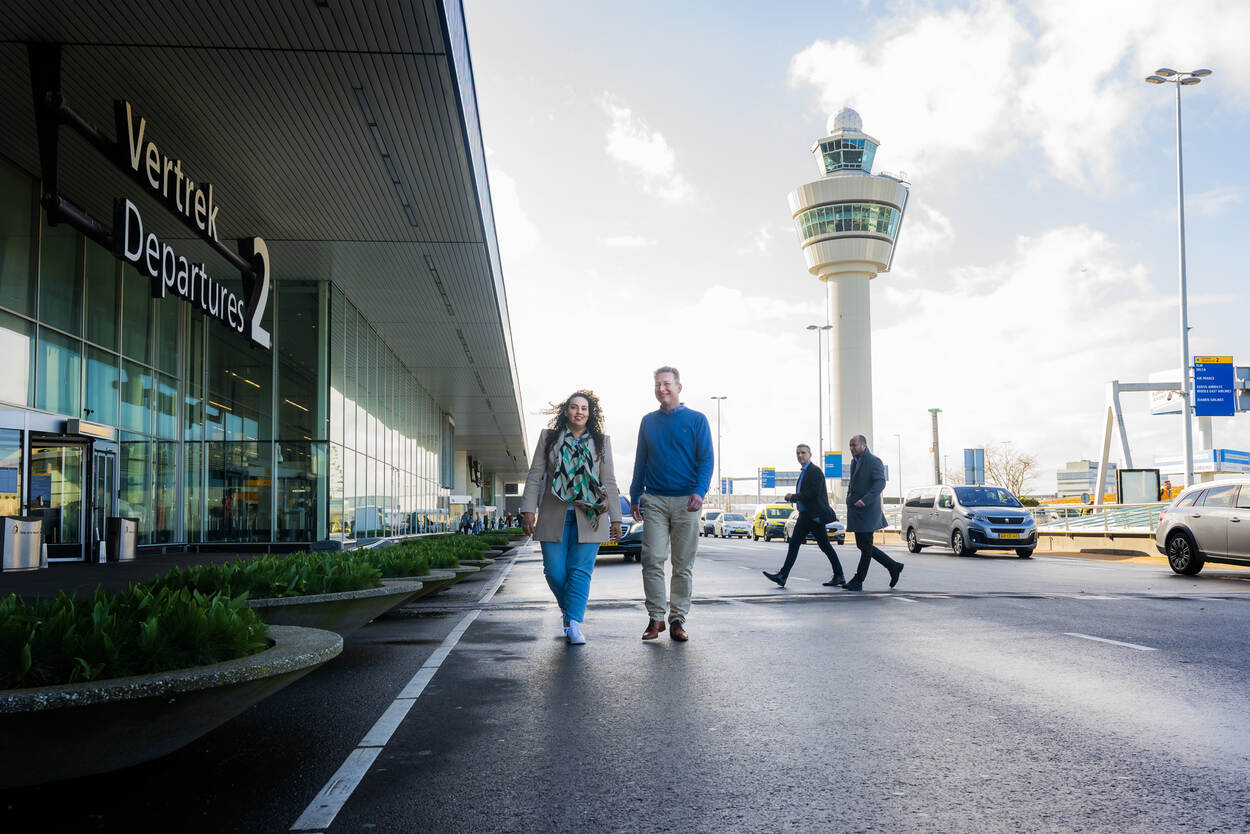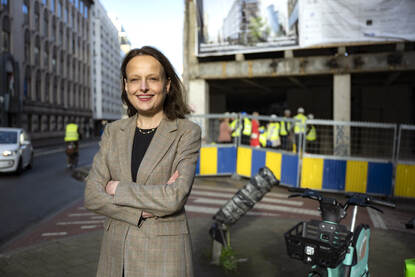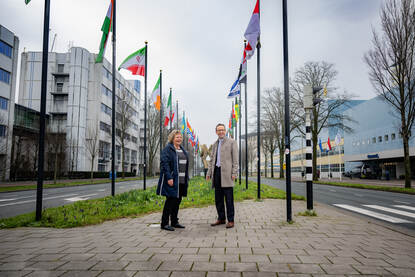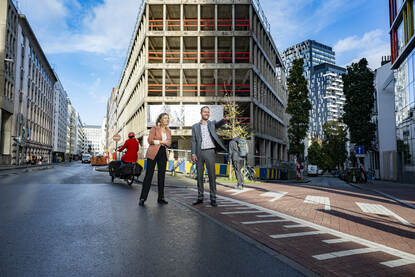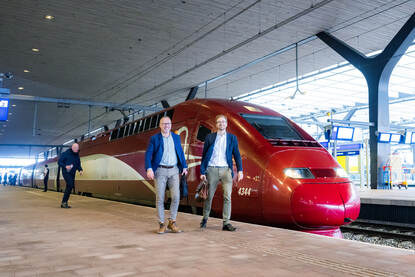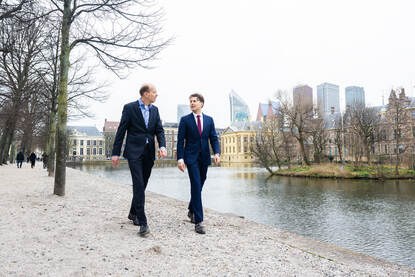Facilitating the staff transfer process
Congratulations! You’re on your way to your next posting…now what? If you’re being transferred within central government, 3W|WorldWide Working is your one-stop shop for your ticket, passport, allowances and moving arrangements. But what products and services are you supposed to request where, and at what stage in the process? So many things have to be organised before you start your new posting. Recently, 3W decided that the time had come to improve the way the various parts of the process fit together and to make its services more efficient and customer-friendly. The result: greater convenience for staff members (and their partner/family) who are being transferred, improved efficiency for 3W, and less red tape for all concerned.

'The transfer process will stay the same, but when offering our services and information we will respond better to the needs of our colleagues.'
Transfer period
Over the past few years, in order to improve its overall service, 3W has mapped out and optimised various ‘customer journeys’. ‘We focused particularly closely on the lead-up to a transfer,’ explains Daniel Witjes, who coordinates staff transfers to the Caribbean region. ‘This is a period when you’re being given a great deal of information in a short amount of time, and you need to arrange a lot of things, like a ticket, a visa, an allowance, your move, a temporary and permanent address, and so on. It’s easy to forget things, or to submit a request late. In the past, the order in which certain tasks had to be performed wasn’t always logical, and in some cases, staff members had to submit the same information several times.’
The right information at the right time
3W aims to improve the ‘customer experiences’ by presenting the steps of the transfer process in the right order and at the right time. This is not a new system, but rather an improved way of using the tools we already have. Our internal name for this is ‘Project Flamingo’, but it’s really more of a new mindset: looking at how we can best respond to the needs or our colleagues. We want to provide information at the moment it’s relevant, in easily digestible form and specifically for the period in question, with as little red tape as possible. We try to make sure we only ask for information once, and then re-use it for the rest of the transfer process. This means our process and communication are adapted to the needs of the client, Daniel explains. ‘The 'customer', our colleague, wants things to be as simple as possible: they expect a process that is quick and straightforward. Previously, the information sent to colleagues before a posting abroad was not well coordinated, and at times it was rather fragmented. Together with colleagues from various units in the chain, we’ve looked at how we can combine that information and present it at the most appropriate time. It’s a bonus that people are now working together more closely on both the content of the information and the process as a whole. But there’s also a technological dimension. So we worked with the Information Management and Control Division, to streamline and, if necessary, automate the different steps.’
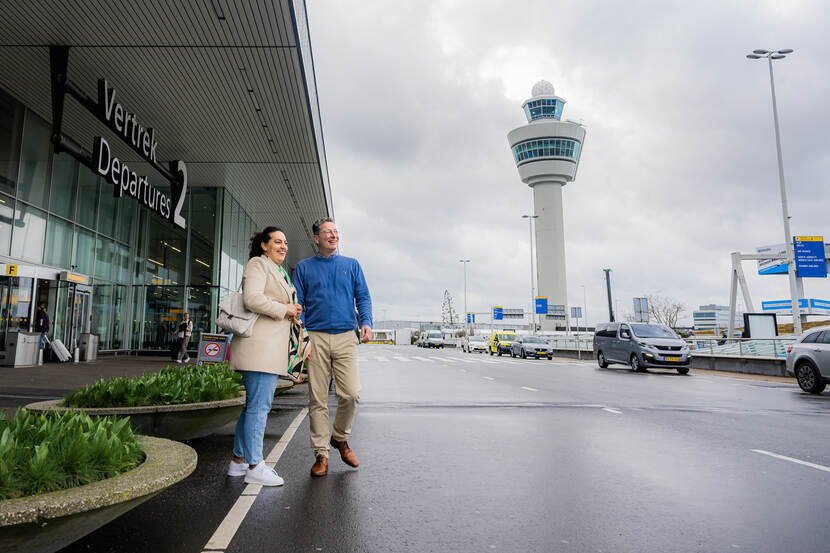
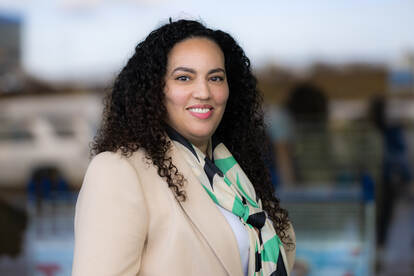
'With the data that’s already available in our systems, we give colleagues the information they need, at the right moment’.
Putting ‘the client’ centre stage
‘With the data that is available in all our systems, we can give colleagues the information they need, at the right moment,’ said Mirjam Afkir, coordinator of 3W’s administration team. ‘On the basis of the establishment post number, we know what the person’s new position or duty station will be, and whether or not it’s a managerial role. In the event of a transfer at the Ministry in The Hague this information is now automatically extracted from the letter containing the placement decision. This saves people having to fill in the entire form. After receiving their letter, we automatically send the colleague in question a message, and all they have to do is fill in the departure date, after conferring with their manager. The administration team will receive an update as soon as this information has been completed.’
Postings to the Caribbean region
The customer journey for staff postings to the Caribbean region went live on Tuesday 7 March. Staff from all government ministries can be transferred to the Caribbean part of the Kingdom. Various rules and schemes apply to this process, which Daniel acknowledges can make this particular customer journey complex. ‘The advantage of this type of posting is that the client contact person at the ministry in question provides us with a lot of the basic information. This data is then re-used in many subsequent steps in the customer journey, such as moving house, scheduling medical exams, setting up a Travelpoint account or accessing the digital archive or Partner Plaza. This same procedure can be modified and used for other customer journeys, such as transfers to and from missions abroad.
The aim of Project Flamingo is to improve the customer experience. We’re focused on needs of our colleagues, and we reflect on what we can do for them, and when. Our method is to take account of the whole process, rather than zooming in on the details.
As soon as we get a notification from a colleague posted abroad through the Self Service Portal (SSP), we can follow the whole customer journey. Our 10-person Caribbean team will now function more as customer managers. Although the process will in theory remain the same, it has been reorganised, based on the principles of the customer journey.’
Digital where possible, in-person where necessary
‘By digitalising the standard processes, we have more time to offer advice and service tailored to the individual. Our added value lies in the person-to-person contact we provide: good advice, a customised approach and a good preparatory conversation. This keeps things personal. Everything is organised around the client: we look at what they need at a particular given time, and we try to minimise the administrative burden,’ Daniel says. ‘Our “welcome” email is now much more personalised, with a first name and duty station, and we also let the person know that they will be sent their Travelpoint login details and instructions a few days later.’
Reducing red tape
‘We no longer have to request all sorts of different forms. Instead we now work with a control panel that consists of a single digital form in the Self Service Portal (SSP), where you only have to enter information once. This is less time-consuming and less likely to lead to mistakes, and everything is clearer for both the back office and the staff member being transferred. This will really cut down on red tape,’ Daniel explains. ‘Staff information will soon be accessible and available for those who need to process it, and we no longer need to request it every single time. This makes working together easier and more transparent. The mindset we want to cultivate within the organisation is guided by questions like: ‘Why am I doing or asking this? Does it make sense? Does it make the process more efficient? Do I really need this information?’
Starting small
Daniel says that other people who wish to align their processes with their clients’ needs should start small and test things out. ‘Start with version 1.0, then test it on colleagues and go from there. You don’t have to start out with version 4.0,’ he stresses. Mirjam adds: ‘Even though there are many units involved in this project, we’ve kept things as small-scale as possible. This has helped us change gears quickly, and act decisively and flexibly. It’s important not to lose sight of why you’re doing this, and for whom.’
More information about 3W?
- WereldWijdWerken | SSO3W
- 3w | WereldWijdWerken - Rijksportaal (overheid-i.nl) (only accessible to Central Government employees)
